Entrepreneurial Ventures: Types, Impact, and Social Development
VerifiedAdded on 2022/11/25
|9
|2200
|288
Report
AI Summary
This report delves into the multifaceted world of entrepreneurial ventures, exploring different types such as small business entrepreneurs, large company entrepreneurs, scalable start-up entrepreneurs, and social entrepreneurs. It examines the similarities and differences between these ventures, highlighting their shared goals of growth and profit while differentiating their approaches to market needs and social impact. The report further analyzes the significant impact of small businesses on the UK economy, emphasizing their contribution to revenue generation, employment, and the fulfillment of consumer demands. It also underscores the crucial value of small business enterprises and start-ups for social and economic development, particularly in fostering a dynamic economy, promoting a circular economy, boosting production of goods and services, and opening new markets. The report concludes by summarizing the key findings and emphasizing the importance of entrepreneurial mindsets and experiences in determining success.
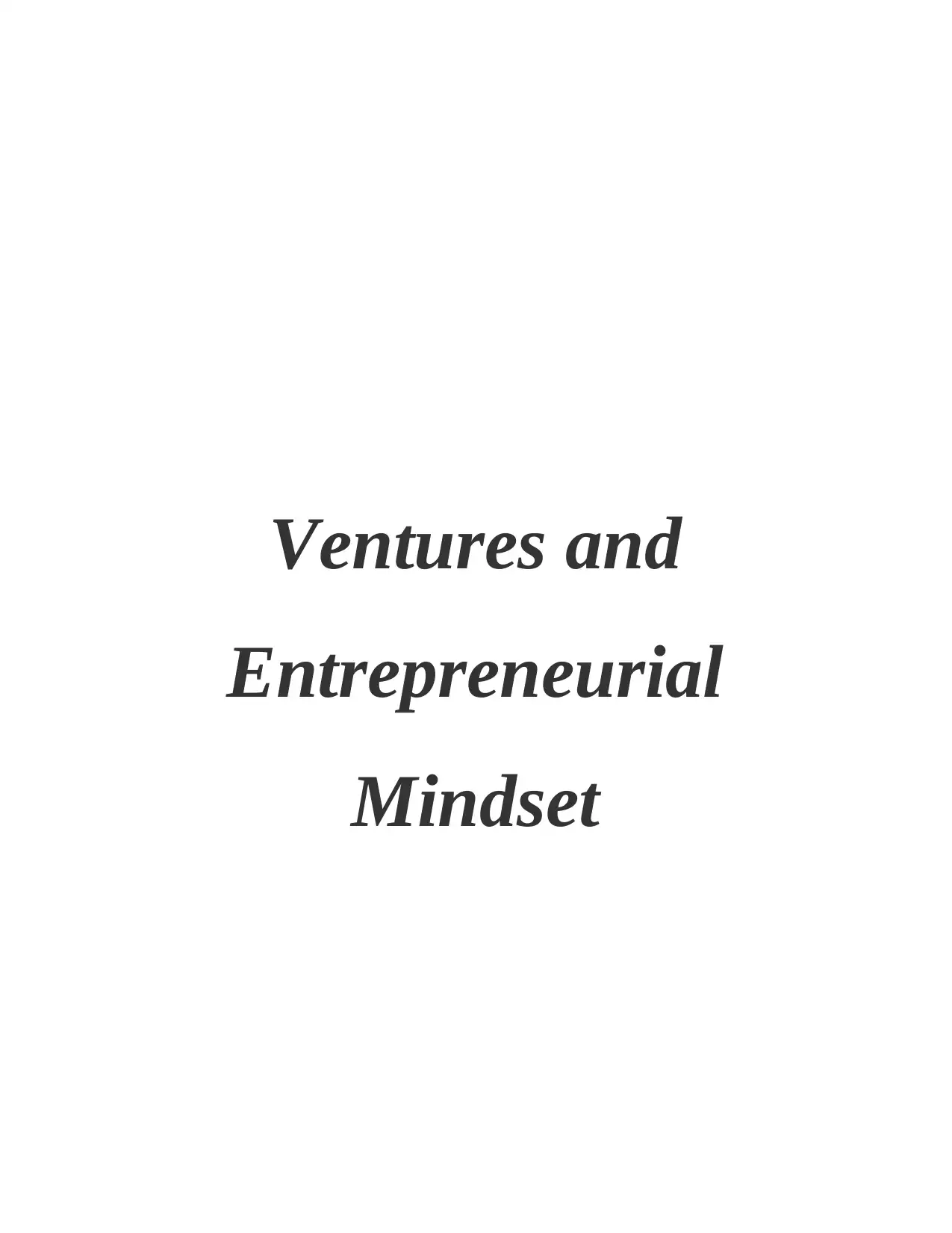
Ventures and
Entrepreneurial
Mindset
Entrepreneurial
Mindset
Paraphrase This Document
Need a fresh take? Get an instant paraphrase of this document with our AI Paraphraser
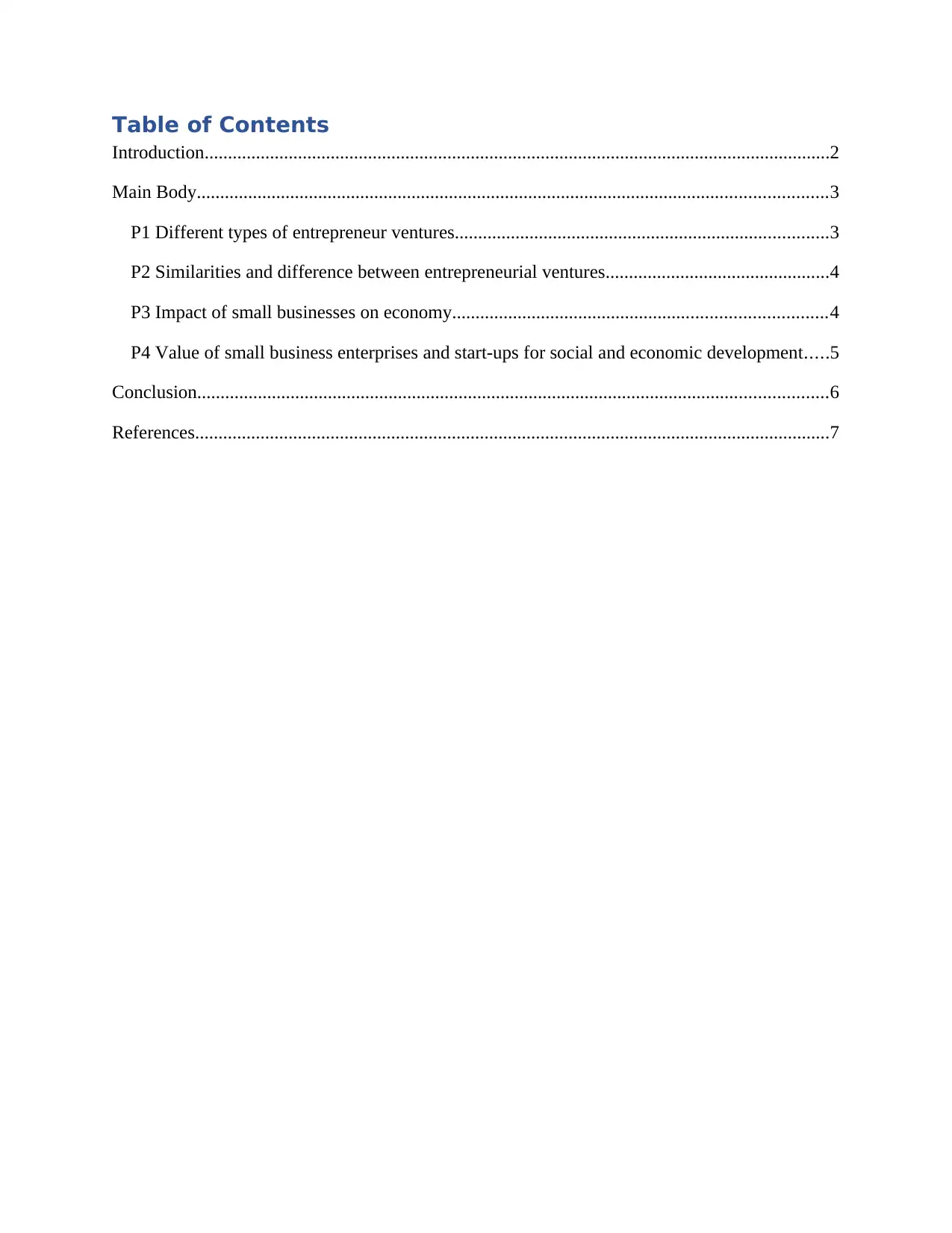
Table of Contents
Introduction......................................................................................................................................2
Main Body.......................................................................................................................................3
P1 Different types of entrepreneur ventures................................................................................3
P2 Similarities and difference between entrepreneurial ventures................................................4
P3 Impact of small businesses on economy................................................................................4
P4 Value of small business enterprises and start-ups for social and economic development.....5
Conclusion.......................................................................................................................................6
References........................................................................................................................................7
Introduction......................................................................................................................................2
Main Body.......................................................................................................................................3
P1 Different types of entrepreneur ventures................................................................................3
P2 Similarities and difference between entrepreneurial ventures................................................4
P3 Impact of small businesses on economy................................................................................4
P4 Value of small business enterprises and start-ups for social and economic development.....5
Conclusion.......................................................................................................................................6
References........................................................................................................................................7
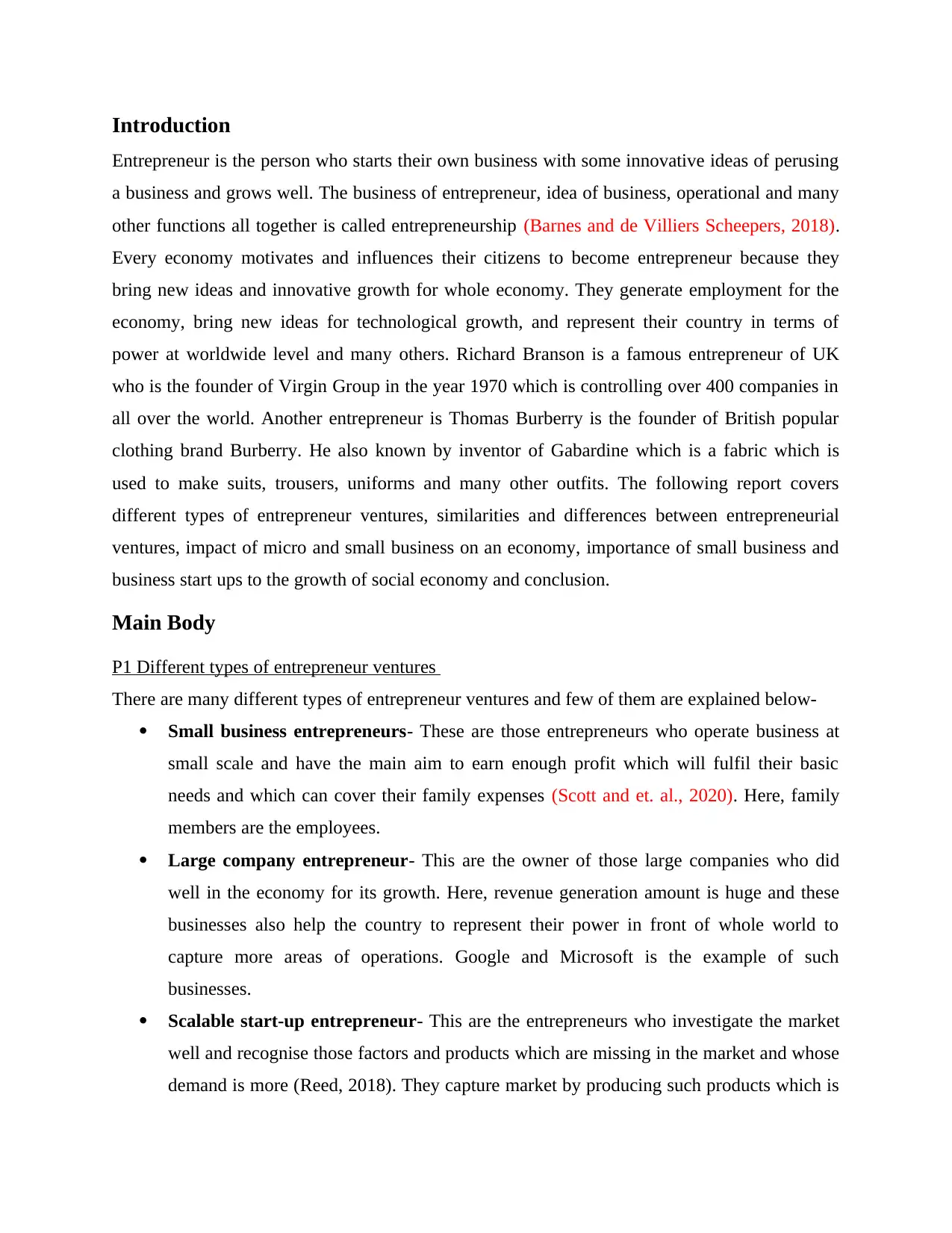
Introduction
Entrepreneur is the person who starts their own business with some innovative ideas of perusing
a business and grows well. The business of entrepreneur, idea of business, operational and many
other functions all together is called entrepreneurship (Barnes and de Villiers Scheepers, 2018).
Every economy motivates and influences their citizens to become entrepreneur because they
bring new ideas and innovative growth for whole economy. They generate employment for the
economy, bring new ideas for technological growth, and represent their country in terms of
power at worldwide level and many others. Richard Branson is a famous entrepreneur of UK
who is the founder of Virgin Group in the year 1970 which is controlling over 400 companies in
all over the world. Another entrepreneur is Thomas Burberry is the founder of British popular
clothing brand Burberry. He also known by inventor of Gabardine which is a fabric which is
used to make suits, trousers, uniforms and many other outfits. The following report covers
different types of entrepreneur ventures, similarities and differences between entrepreneurial
ventures, impact of micro and small business on an economy, importance of small business and
business start ups to the growth of social economy and conclusion.
Main Body
P1 Different types of entrepreneur ventures
There are many different types of entrepreneur ventures and few of them are explained below-
Small business entrepreneurs- These are those entrepreneurs who operate business at
small scale and have the main aim to earn enough profit which will fulfil their basic
needs and which can cover their family expenses (Scott and et. al., 2020). Here, family
members are the employees.
Large company entrepreneur- This are the owner of those large companies who did
well in the economy for its growth. Here, revenue generation amount is huge and these
businesses also help the country to represent their power in front of whole world to
capture more areas of operations. Google and Microsoft is the example of such
businesses.
Scalable start-up entrepreneur- This are the entrepreneurs who investigate the market
well and recognise those factors and products which are missing in the market and whose
demand is more (Reed, 2018). They capture market by producing such products which is
Entrepreneur is the person who starts their own business with some innovative ideas of perusing
a business and grows well. The business of entrepreneur, idea of business, operational and many
other functions all together is called entrepreneurship (Barnes and de Villiers Scheepers, 2018).
Every economy motivates and influences their citizens to become entrepreneur because they
bring new ideas and innovative growth for whole economy. They generate employment for the
economy, bring new ideas for technological growth, and represent their country in terms of
power at worldwide level and many others. Richard Branson is a famous entrepreneur of UK
who is the founder of Virgin Group in the year 1970 which is controlling over 400 companies in
all over the world. Another entrepreneur is Thomas Burberry is the founder of British popular
clothing brand Burberry. He also known by inventor of Gabardine which is a fabric which is
used to make suits, trousers, uniforms and many other outfits. The following report covers
different types of entrepreneur ventures, similarities and differences between entrepreneurial
ventures, impact of micro and small business on an economy, importance of small business and
business start ups to the growth of social economy and conclusion.
Main Body
P1 Different types of entrepreneur ventures
There are many different types of entrepreneur ventures and few of them are explained below-
Small business entrepreneurs- These are those entrepreneurs who operate business at
small scale and have the main aim to earn enough profit which will fulfil their basic
needs and which can cover their family expenses (Scott and et. al., 2020). Here, family
members are the employees.
Large company entrepreneur- This are the owner of those large companies who did
well in the economy for its growth. Here, revenue generation amount is huge and these
businesses also help the country to represent their power in front of whole world to
capture more areas of operations. Google and Microsoft is the example of such
businesses.
Scalable start-up entrepreneur- This are the entrepreneurs who investigate the market
well and recognise those factors and products which are missing in the market and whose
demand is more (Reed, 2018). They capture market by producing such products which is
⊘ This is a preview!⊘
Do you want full access?
Subscribe today to unlock all pages.

Trusted by 1+ million students worldwide
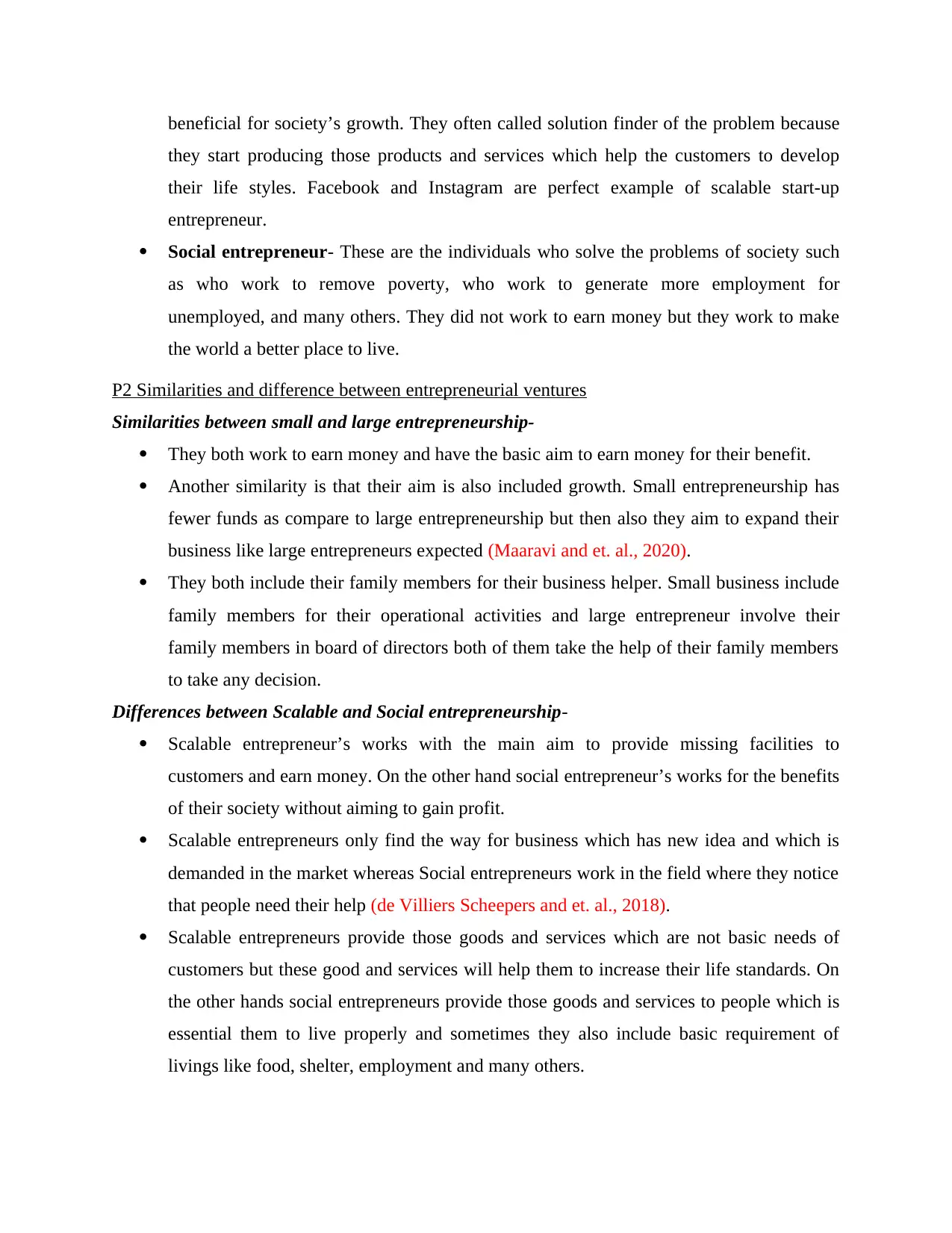
beneficial for society’s growth. They often called solution finder of the problem because
they start producing those products and services which help the customers to develop
their life styles. Facebook and Instagram are perfect example of scalable start-up
entrepreneur.
Social entrepreneur- These are the individuals who solve the problems of society such
as who work to remove poverty, who work to generate more employment for
unemployed, and many others. They did not work to earn money but they work to make
the world a better place to live.
P2 Similarities and difference between entrepreneurial ventures
Similarities between small and large entrepreneurship-
They both work to earn money and have the basic aim to earn money for their benefit.
Another similarity is that their aim is also included growth. Small entrepreneurship has
fewer funds as compare to large entrepreneurship but then also they aim to expand their
business like large entrepreneurs expected (Maaravi and et. al., 2020).
They both include their family members for their business helper. Small business include
family members for their operational activities and large entrepreneur involve their
family members in board of directors both of them take the help of their family members
to take any decision.
Differences between Scalable and Social entrepreneurship-
Scalable entrepreneur’s works with the main aim to provide missing facilities to
customers and earn money. On the other hand social entrepreneur’s works for the benefits
of their society without aiming to gain profit.
Scalable entrepreneurs only find the way for business which has new idea and which is
demanded in the market whereas Social entrepreneurs work in the field where they notice
that people need their help (de Villiers Scheepers and et. al., 2018).
Scalable entrepreneurs provide those goods and services which are not basic needs of
customers but these good and services will help them to increase their life standards. On
the other hands social entrepreneurs provide those goods and services to people which is
essential them to live properly and sometimes they also include basic requirement of
livings like food, shelter, employment and many others.
they start producing those products and services which help the customers to develop
their life styles. Facebook and Instagram are perfect example of scalable start-up
entrepreneur.
Social entrepreneur- These are the individuals who solve the problems of society such
as who work to remove poverty, who work to generate more employment for
unemployed, and many others. They did not work to earn money but they work to make
the world a better place to live.
P2 Similarities and difference between entrepreneurial ventures
Similarities between small and large entrepreneurship-
They both work to earn money and have the basic aim to earn money for their benefit.
Another similarity is that their aim is also included growth. Small entrepreneurship has
fewer funds as compare to large entrepreneurship but then also they aim to expand their
business like large entrepreneurs expected (Maaravi and et. al., 2020).
They both include their family members for their business helper. Small business include
family members for their operational activities and large entrepreneur involve their
family members in board of directors both of them take the help of their family members
to take any decision.
Differences between Scalable and Social entrepreneurship-
Scalable entrepreneur’s works with the main aim to provide missing facilities to
customers and earn money. On the other hand social entrepreneur’s works for the benefits
of their society without aiming to gain profit.
Scalable entrepreneurs only find the way for business which has new idea and which is
demanded in the market whereas Social entrepreneurs work in the field where they notice
that people need their help (de Villiers Scheepers and et. al., 2018).
Scalable entrepreneurs provide those goods and services which are not basic needs of
customers but these good and services will help them to increase their life standards. On
the other hands social entrepreneurs provide those goods and services to people which is
essential them to live properly and sometimes they also include basic requirement of
livings like food, shelter, employment and many others.
Paraphrase This Document
Need a fresh take? Get an instant paraphrase of this document with our AI Paraphraser
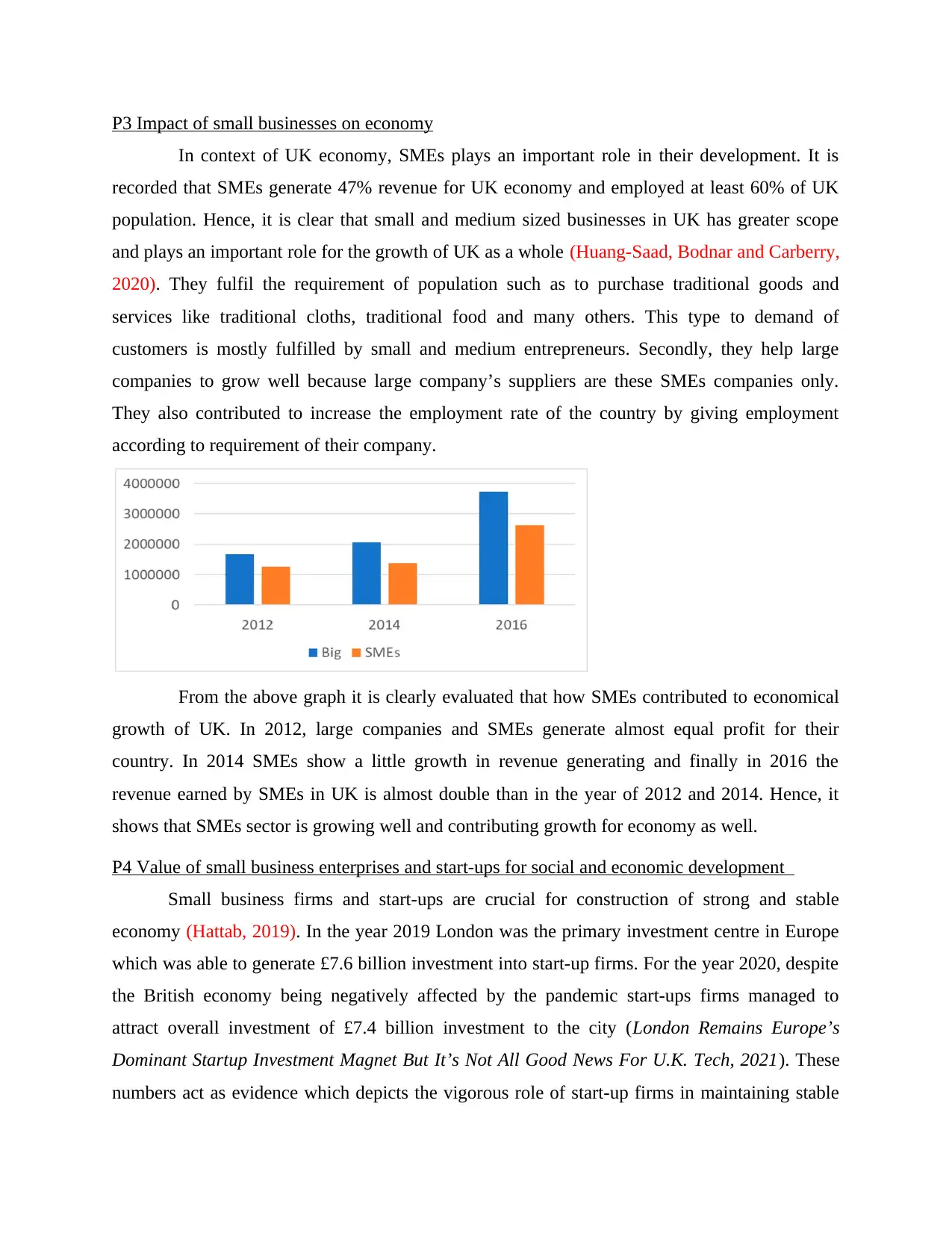
P3 Impact of small businesses on economy
In context of UK economy, SMEs plays an important role in their development. It is
recorded that SMEs generate 47% revenue for UK economy and employed at least 60% of UK
population. Hence, it is clear that small and medium sized businesses in UK has greater scope
and plays an important role for the growth of UK as a whole (Huang-Saad, Bodnar and Carberry,
2020). They fulfil the requirement of population such as to purchase traditional goods and
services like traditional cloths, traditional food and many others. This type to demand of
customers is mostly fulfilled by small and medium entrepreneurs. Secondly, they help large
companies to grow well because large company’s suppliers are these SMEs companies only.
They also contributed to increase the employment rate of the country by giving employment
according to requirement of their company.
From the above graph it is clearly evaluated that how SMEs contributed to economical
growth of UK. In 2012, large companies and SMEs generate almost equal profit for their
country. In 2014 SMEs show a little growth in revenue generating and finally in 2016 the
revenue earned by SMEs in UK is almost double than in the year of 2012 and 2014. Hence, it
shows that SMEs sector is growing well and contributing growth for economy as well.
P4 Value of small business enterprises and start-ups for social and economic development
Small business firms and start-ups are crucial for construction of strong and stable
economy (Hattab, 2019). In the year 2019 London was the primary investment centre in Europe
which was able to generate £7.6 billion investment into start-up firms. For the year 2020, despite
the British economy being negatively affected by the pandemic start-ups firms managed to
attract overall investment of £7.4 billion investment to the city (London Remains Europe’s
Dominant Startup Investment Magnet But It’s Not All Good News For U.K. Tech, 2021). These
numbers act as evidence which depicts the vigorous role of start-up firms in maintaining stable
In context of UK economy, SMEs plays an important role in their development. It is
recorded that SMEs generate 47% revenue for UK economy and employed at least 60% of UK
population. Hence, it is clear that small and medium sized businesses in UK has greater scope
and plays an important role for the growth of UK as a whole (Huang-Saad, Bodnar and Carberry,
2020). They fulfil the requirement of population such as to purchase traditional goods and
services like traditional cloths, traditional food and many others. This type to demand of
customers is mostly fulfilled by small and medium entrepreneurs. Secondly, they help large
companies to grow well because large company’s suppliers are these SMEs companies only.
They also contributed to increase the employment rate of the country by giving employment
according to requirement of their company.
From the above graph it is clearly evaluated that how SMEs contributed to economical
growth of UK. In 2012, large companies and SMEs generate almost equal profit for their
country. In 2014 SMEs show a little growth in revenue generating and finally in 2016 the
revenue earned by SMEs in UK is almost double than in the year of 2012 and 2014. Hence, it
shows that SMEs sector is growing well and contributing growth for economy as well.
P4 Value of small business enterprises and start-ups for social and economic development
Small business firms and start-ups are crucial for construction of strong and stable
economy (Hattab, 2019). In the year 2019 London was the primary investment centre in Europe
which was able to generate £7.6 billion investment into start-up firms. For the year 2020, despite
the British economy being negatively affected by the pandemic start-ups firms managed to
attract overall investment of £7.4 billion investment to the city (London Remains Europe’s
Dominant Startup Investment Magnet But It’s Not All Good News For U.K. Tech, 2021). These
numbers act as evidence which depicts the vigorous role of start-up firms in maintaining stable
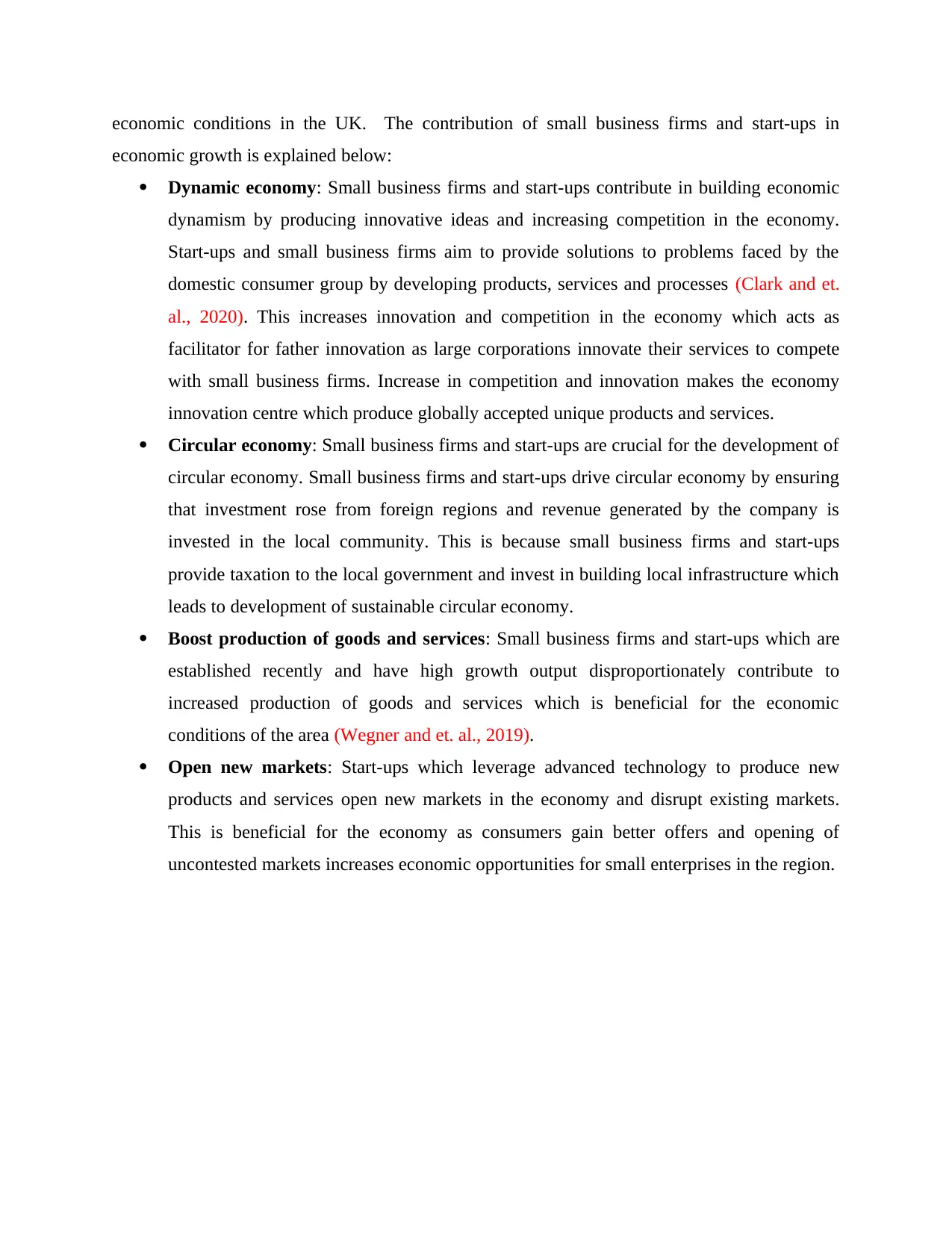
economic conditions in the UK. The contribution of small business firms and start-ups in
economic growth is explained below:
Dynamic economy: Small business firms and start-ups contribute in building economic
dynamism by producing innovative ideas and increasing competition in the economy.
Start-ups and small business firms aim to provide solutions to problems faced by the
domestic consumer group by developing products, services and processes (Clark and et.
al., 2020). This increases innovation and competition in the economy which acts as
facilitator for father innovation as large corporations innovate their services to compete
with small business firms. Increase in competition and innovation makes the economy
innovation centre which produce globally accepted unique products and services.
Circular economy: Small business firms and start-ups are crucial for the development of
circular economy. Small business firms and start-ups drive circular economy by ensuring
that investment rose from foreign regions and revenue generated by the company is
invested in the local community. This is because small business firms and start-ups
provide taxation to the local government and invest in building local infrastructure which
leads to development of sustainable circular economy.
Boost production of goods and services: Small business firms and start-ups which are
established recently and have high growth output disproportionately contribute to
increased production of goods and services which is beneficial for the economic
conditions of the area (Wegner and et. al., 2019).
Open new markets: Start-ups which leverage advanced technology to produce new
products and services open new markets in the economy and disrupt existing markets.
This is beneficial for the economy as consumers gain better offers and opening of
uncontested markets increases economic opportunities for small enterprises in the region.
economic growth is explained below:
Dynamic economy: Small business firms and start-ups contribute in building economic
dynamism by producing innovative ideas and increasing competition in the economy.
Start-ups and small business firms aim to provide solutions to problems faced by the
domestic consumer group by developing products, services and processes (Clark and et.
al., 2020). This increases innovation and competition in the economy which acts as
facilitator for father innovation as large corporations innovate their services to compete
with small business firms. Increase in competition and innovation makes the economy
innovation centre which produce globally accepted unique products and services.
Circular economy: Small business firms and start-ups are crucial for the development of
circular economy. Small business firms and start-ups drive circular economy by ensuring
that investment rose from foreign regions and revenue generated by the company is
invested in the local community. This is because small business firms and start-ups
provide taxation to the local government and invest in building local infrastructure which
leads to development of sustainable circular economy.
Boost production of goods and services: Small business firms and start-ups which are
established recently and have high growth output disproportionately contribute to
increased production of goods and services which is beneficial for the economic
conditions of the area (Wegner and et. al., 2019).
Open new markets: Start-ups which leverage advanced technology to produce new
products and services open new markets in the economy and disrupt existing markets.
This is beneficial for the economy as consumers gain better offers and opening of
uncontested markets increases economic opportunities for small enterprises in the region.
⊘ This is a preview!⊘
Do you want full access?
Subscribe today to unlock all pages.

Trusted by 1+ million students worldwide
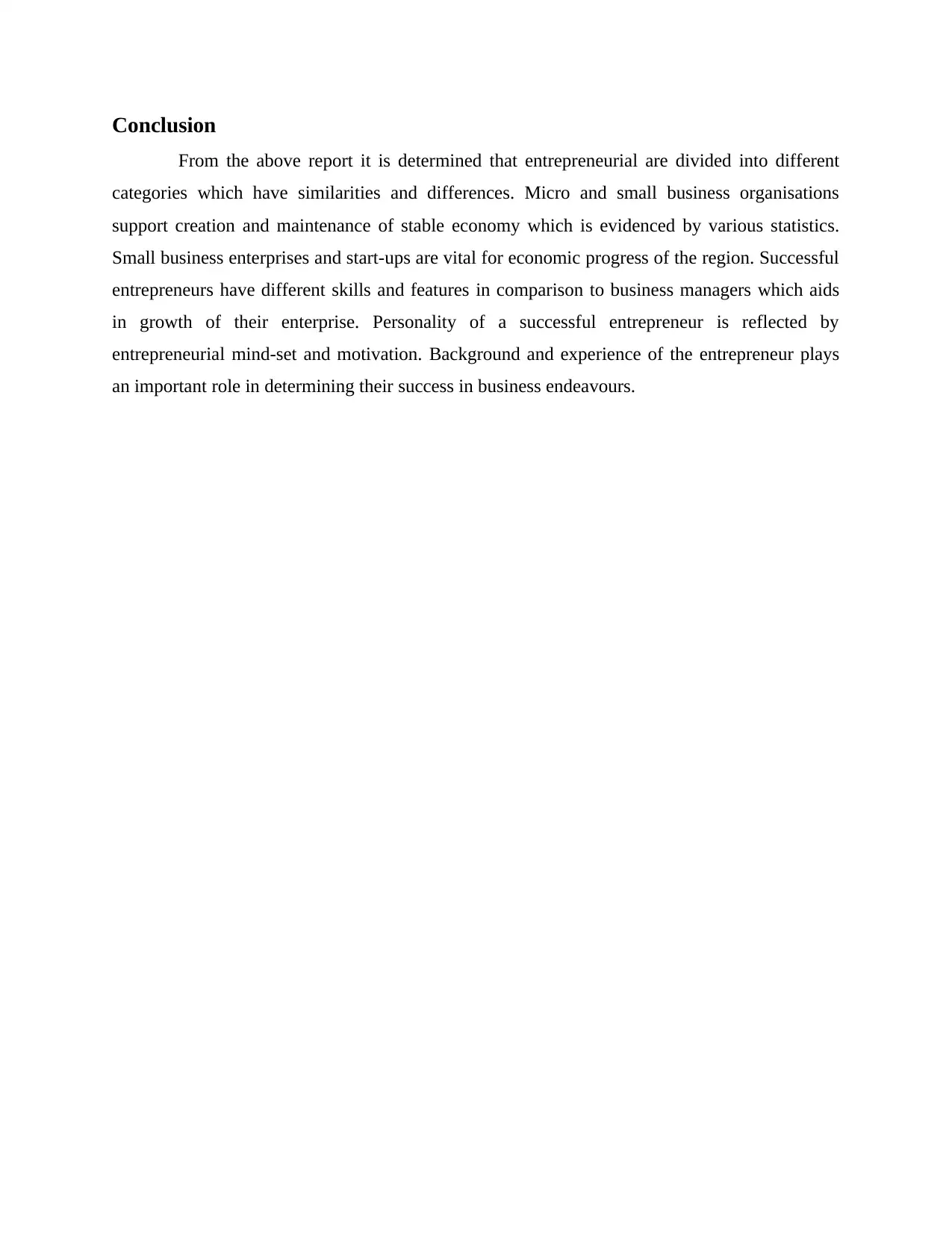
Conclusion
From the above report it is determined that entrepreneurial are divided into different
categories which have similarities and differences. Micro and small business organisations
support creation and maintenance of stable economy which is evidenced by various statistics.
Small business enterprises and start-ups are vital for economic progress of the region. Successful
entrepreneurs have different skills and features in comparison to business managers which aids
in growth of their enterprise. Personality of a successful entrepreneur is reflected by
entrepreneurial mind-set and motivation. Background and experience of the entrepreneur plays
an important role in determining their success in business endeavours.
From the above report it is determined that entrepreneurial are divided into different
categories which have similarities and differences. Micro and small business organisations
support creation and maintenance of stable economy which is evidenced by various statistics.
Small business enterprises and start-ups are vital for economic progress of the region. Successful
entrepreneurs have different skills and features in comparison to business managers which aids
in growth of their enterprise. Personality of a successful entrepreneur is reflected by
entrepreneurial mind-set and motivation. Background and experience of the entrepreneur plays
an important role in determining their success in business endeavours.
Paraphrase This Document
Need a fresh take? Get an instant paraphrase of this document with our AI Paraphraser
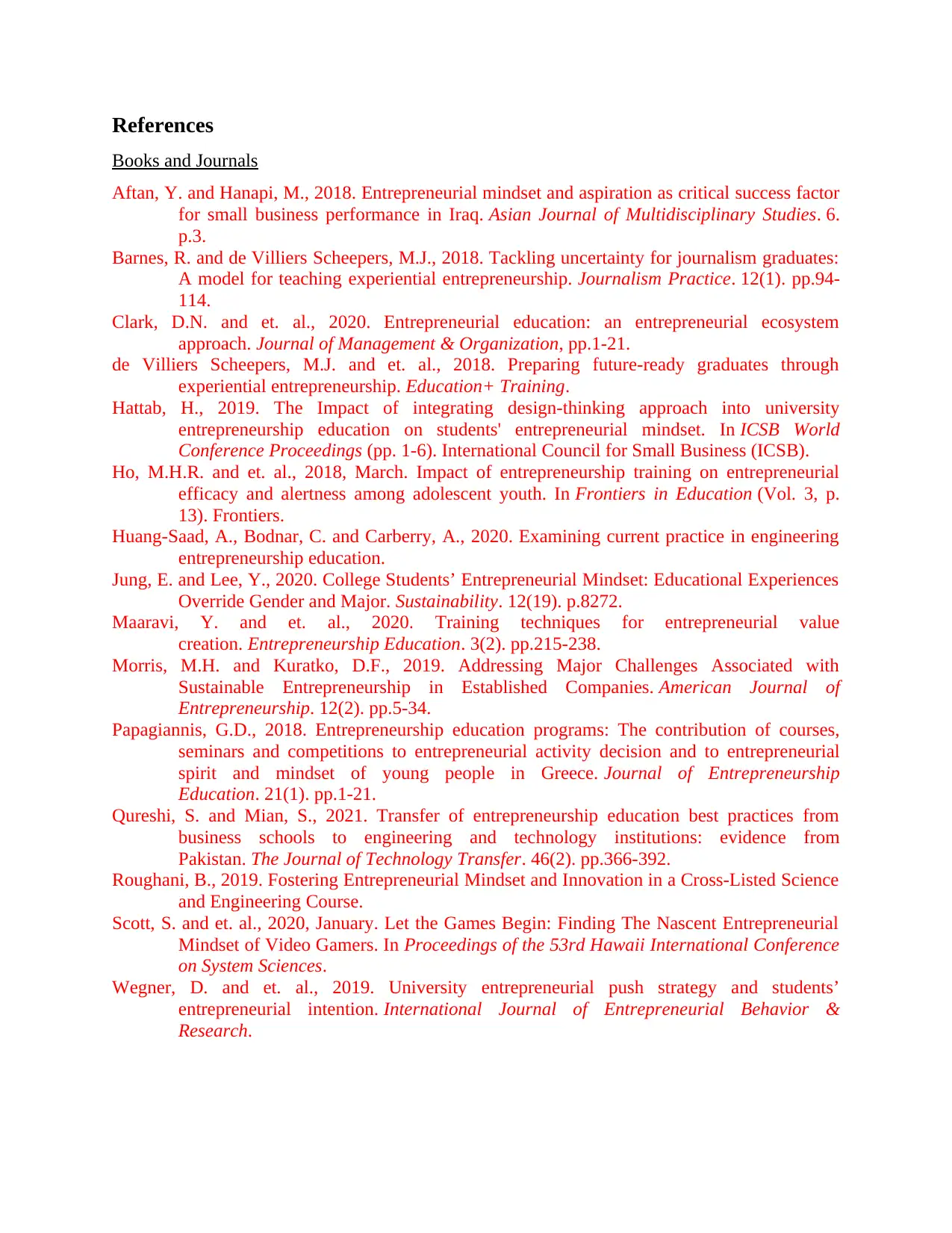
References
Books and Journals
Aftan, Y. and Hanapi, M., 2018. Entrepreneurial mindset and aspiration as critical success factor
for small business performance in Iraq. Asian Journal of Multidisciplinary Studies. 6.
p.3.
Barnes, R. and de Villiers Scheepers, M.J., 2018. Tackling uncertainty for journalism graduates:
A model for teaching experiential entrepreneurship. Journalism Practice. 12(1). pp.94-
114.
Clark, D.N. and et. al., 2020. Entrepreneurial education: an entrepreneurial ecosystem
approach. Journal of Management & Organization, pp.1-21.
de Villiers Scheepers, M.J. and et. al., 2018. Preparing future-ready graduates through
experiential entrepreneurship. Education+ Training.
Hattab, H., 2019. The Impact of integrating design-thinking approach into university
entrepreneurship education on students' entrepreneurial mindset. In ICSB World
Conference Proceedings (pp. 1-6). International Council for Small Business (ICSB).
Ho, M.H.R. and et. al., 2018, March. Impact of entrepreneurship training on entrepreneurial
efficacy and alertness among adolescent youth. In Frontiers in Education (Vol. 3, p.
13). Frontiers.
Huang-Saad, A., Bodnar, C. and Carberry, A., 2020. Examining current practice in engineering
entrepreneurship education.
Jung, E. and Lee, Y., 2020. College Students’ Entrepreneurial Mindset: Educational Experiences
Override Gender and Major. Sustainability. 12(19). p.8272.
Maaravi, Y. and et. al., 2020. Training techniques for entrepreneurial value
creation. Entrepreneurship Education. 3(2). pp.215-238.
Morris, M.H. and Kuratko, D.F., 2019. Addressing Major Challenges Associated with
Sustainable Entrepreneurship in Established Companies. American Journal of
Entrepreneurship. 12(2). pp.5-34.
Papagiannis, G.D., 2018. Entrepreneurship education programs: The contribution of courses,
seminars and competitions to entrepreneurial activity decision and to entrepreneurial
spirit and mindset of young people in Greece. Journal of Entrepreneurship
Education. 21(1). pp.1-21.
Qureshi, S. and Mian, S., 2021. Transfer of entrepreneurship education best practices from
business schools to engineering and technology institutions: evidence from
Pakistan. The Journal of Technology Transfer. 46(2). pp.366-392.
Roughani, B., 2019. Fostering Entrepreneurial Mindset and Innovation in a Cross-Listed Science
and Engineering Course.
Scott, S. and et. al., 2020, January. Let the Games Begin: Finding The Nascent Entrepreneurial
Mindset of Video Gamers. In Proceedings of the 53rd Hawaii International Conference
on System Sciences.
Wegner, D. and et. al., 2019. University entrepreneurial push strategy and students’
entrepreneurial intention. International Journal of Entrepreneurial Behavior &
Research.
Books and Journals
Aftan, Y. and Hanapi, M., 2018. Entrepreneurial mindset and aspiration as critical success factor
for small business performance in Iraq. Asian Journal of Multidisciplinary Studies. 6.
p.3.
Barnes, R. and de Villiers Scheepers, M.J., 2018. Tackling uncertainty for journalism graduates:
A model for teaching experiential entrepreneurship. Journalism Practice. 12(1). pp.94-
114.
Clark, D.N. and et. al., 2020. Entrepreneurial education: an entrepreneurial ecosystem
approach. Journal of Management & Organization, pp.1-21.
de Villiers Scheepers, M.J. and et. al., 2018. Preparing future-ready graduates through
experiential entrepreneurship. Education+ Training.
Hattab, H., 2019. The Impact of integrating design-thinking approach into university
entrepreneurship education on students' entrepreneurial mindset. In ICSB World
Conference Proceedings (pp. 1-6). International Council for Small Business (ICSB).
Ho, M.H.R. and et. al., 2018, March. Impact of entrepreneurship training on entrepreneurial
efficacy and alertness among adolescent youth. In Frontiers in Education (Vol. 3, p.
13). Frontiers.
Huang-Saad, A., Bodnar, C. and Carberry, A., 2020. Examining current practice in engineering
entrepreneurship education.
Jung, E. and Lee, Y., 2020. College Students’ Entrepreneurial Mindset: Educational Experiences
Override Gender and Major. Sustainability. 12(19). p.8272.
Maaravi, Y. and et. al., 2020. Training techniques for entrepreneurial value
creation. Entrepreneurship Education. 3(2). pp.215-238.
Morris, M.H. and Kuratko, D.F., 2019. Addressing Major Challenges Associated with
Sustainable Entrepreneurship in Established Companies. American Journal of
Entrepreneurship. 12(2). pp.5-34.
Papagiannis, G.D., 2018. Entrepreneurship education programs: The contribution of courses,
seminars and competitions to entrepreneurial activity decision and to entrepreneurial
spirit and mindset of young people in Greece. Journal of Entrepreneurship
Education. 21(1). pp.1-21.
Qureshi, S. and Mian, S., 2021. Transfer of entrepreneurship education best practices from
business schools to engineering and technology institutions: evidence from
Pakistan. The Journal of Technology Transfer. 46(2). pp.366-392.
Roughani, B., 2019. Fostering Entrepreneurial Mindset and Innovation in a Cross-Listed Science
and Engineering Course.
Scott, S. and et. al., 2020, January. Let the Games Begin: Finding The Nascent Entrepreneurial
Mindset of Video Gamers. In Proceedings of the 53rd Hawaii International Conference
on System Sciences.
Wegner, D. and et. al., 2019. University entrepreneurial push strategy and students’
entrepreneurial intention. International Journal of Entrepreneurial Behavior &
Research.
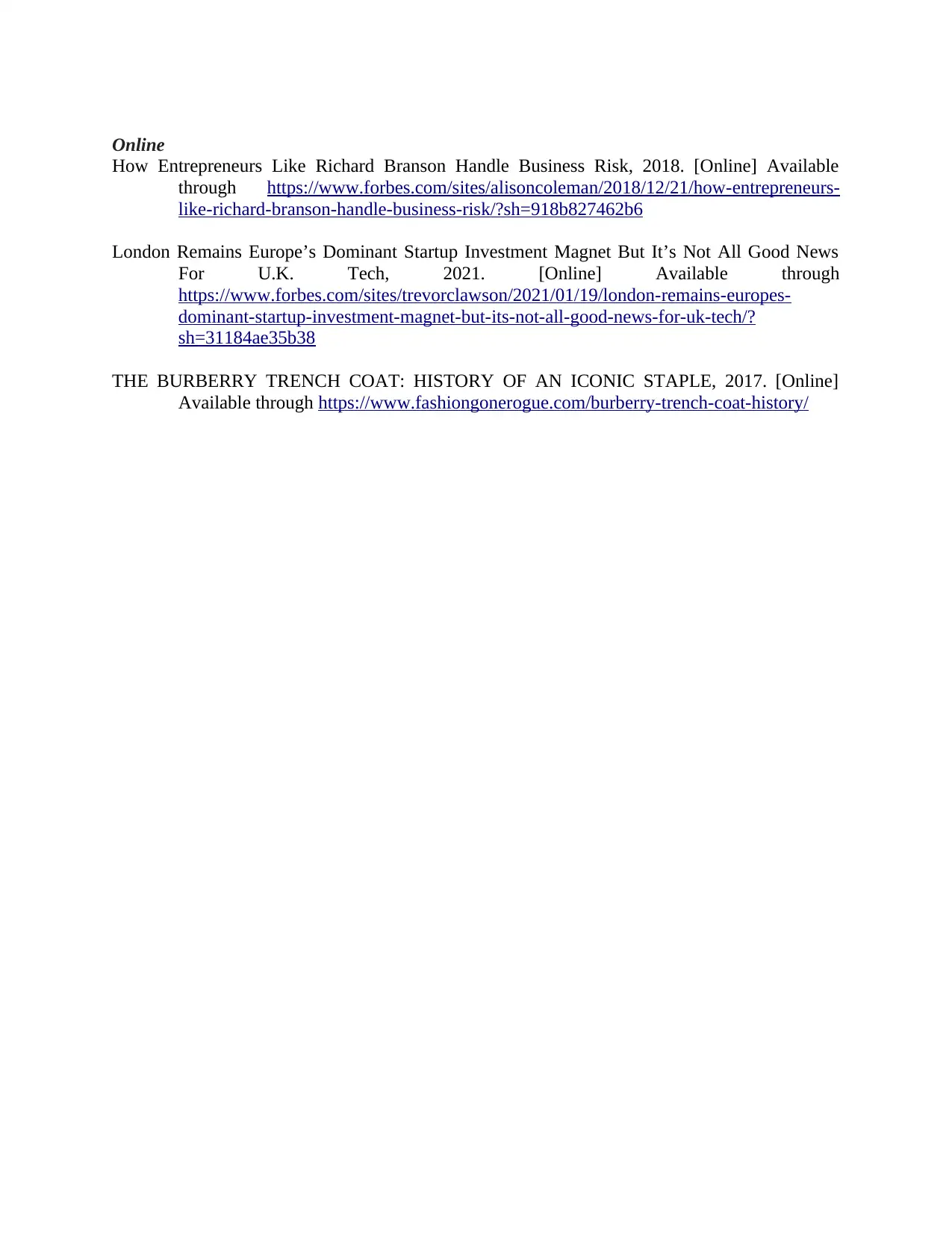
Online
How Entrepreneurs Like Richard Branson Handle Business Risk, 2018. [Online] Available
through https://www.forbes.com/sites/alisoncoleman/2018/12/21/how-entrepreneurs-
like-richard-branson-handle-business-risk/?sh=918b827462b6
London Remains Europe’s Dominant Startup Investment Magnet But It’s Not All Good News
For U.K. Tech, 2021. [Online] Available through
https://www.forbes.com/sites/trevorclawson/2021/01/19/london-remains-europes-
dominant-startup-investment-magnet-but-its-not-all-good-news-for-uk-tech/?
sh=31184ae35b38
THE BURBERRY TRENCH COAT: HISTORY OF AN ICONIC STAPLE, 2017. [Online]
Available through https://www.fashiongonerogue.com/burberry-trench-coat-history/
How Entrepreneurs Like Richard Branson Handle Business Risk, 2018. [Online] Available
through https://www.forbes.com/sites/alisoncoleman/2018/12/21/how-entrepreneurs-
like-richard-branson-handle-business-risk/?sh=918b827462b6
London Remains Europe’s Dominant Startup Investment Magnet But It’s Not All Good News
For U.K. Tech, 2021. [Online] Available through
https://www.forbes.com/sites/trevorclawson/2021/01/19/london-remains-europes-
dominant-startup-investment-magnet-but-its-not-all-good-news-for-uk-tech/?
sh=31184ae35b38
THE BURBERRY TRENCH COAT: HISTORY OF AN ICONIC STAPLE, 2017. [Online]
Available through https://www.fashiongonerogue.com/burberry-trench-coat-history/
⊘ This is a preview!⊘
Do you want full access?
Subscribe today to unlock all pages.

Trusted by 1+ million students worldwide
1 out of 9
Related Documents
Your All-in-One AI-Powered Toolkit for Academic Success.
+13062052269
info@desklib.com
Available 24*7 on WhatsApp / Email
![[object Object]](/_next/static/media/star-bottom.7253800d.svg)
Unlock your academic potential
Copyright © 2020–2026 A2Z Services. All Rights Reserved. Developed and managed by ZUCOL.





